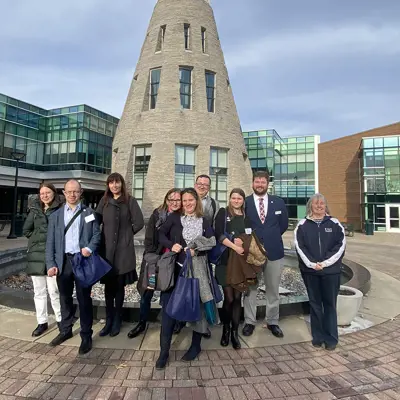
February 24, 2023
USI is no stranger to welcoming international guests to our campus, and on Monday, February 6, the University welcomed a special delegation from Poland to learn more about how USI helps students with disabilities and addresses mental health.
The visit was a part of the Open World Program, sponsored by the Congressional Office for International Leadership and hosted by the Friendship Force Western Kentucky. The seven-member delegation consisted of educators, disability group representatives and their translators. One member of the group is actively involved in establishing services for the influx of Ukrainian refugees in Poland, many of whom not only have pre-existing special needs, but also mental health challenges due to the atrocities they experienced. All came eager to hear how USI works on inclusion, about services tailored to students and to ask questions about challenges faced.
USI was the third stop on the delegates’ 10-day journey, as they traveled the region gathering data and making connections not only on a higher-education level, but with K-12 schools, city and state government officials, local businesses and corporations, medical professionals, nonprofit agencies and organizations, and more.
Upon their arrival at USI, the delegation was greeted by Dr. Mohammed Khayum, Provost and Dr. Emilija Zlatkovska, Executive Director for International Programs. After a brief welcome, Aaron Pryor and Dr. Robin Sanabria, Assistant Director and Director of Counseling and Psychological Services (CAPS) (respectively), and Ronda Stone, Disability Resources Coordinator, gave overviews of their departments. The three USI representatives spent time prior to the delegation’s arrival crafting an outline of the work CAPS and Disabilities Resources does and the support each offers to USI students.
“Building relationships is incredibly important in any healing process, be that in individual therapy or in addressing issues of social justice,” says Pryor. “With that in mind, being identified as representatives of both USI and CAPS was an incredible honor as it placed me in a position to be one of the individuals who helped to set the tone for healing and collaboration on a scale that we don’t often see in our day-to-day work.”
The USI representatives also prepared for the visit by doing research of their own on the work Poland has been addressing when it comes to their citizens who are in need of disability resources and other counseling needs. Poland very recently had a revolution of sorts, in which citizens demanded more care and services for those with disabilities and mental health needs.
Armed with this knowledge, Pryor and Sanabria spoke on topics such as the deinstitutionalization of mental health in the U.S., where there was a shift to more treatment in less restrictive and invasive environments (i.e. prisons and medical institutions), and different types of treatment trends in our country. Stone touched on how to USI helps students who seek out disability resources, walking them through processes to request accommodations in classrooms, tackling challenges that may, and often do, arise and empowering them to succeed in their higher education journeys.
“Spending time with the group was inspiring because some of the programs, sources and resources that we sometimes take for granted here in the U.S. are only beginning to be fully established in Poland,” says Sanabria. “Some legislation for resources was only established there as recently as 2018. I was reminded how fortunate we truly are.”
Michelle Kirk, Manager of Disability Resources, who helped coordinate the presentations, added the opportunity opened a door to her office beyond campus. “When we have an opportunity to both contribute and understand what process, supports and accommodations are being used by other institutions to provide services to students with disabilities, we will all benefit.”
All seven delegates also were introduced to USI alum Elijah Laine, who spoke on how Disability Resources served him during his time as a student. He walked them through how he was able to obtain the accommodations he needed, going through the process of obtaining needed documentation from his doctors, providing that to Disability Resources and filling out necessary paperwork, all following the guidelines which are needed to ensure a student with disabilities is able to obtain an education as any other student.
“Most professors are very accommodating. One thing I found successful during my time at USI is at the beginning of every semester I would meet with my professors one-on-one,” explained Laine. “I would give them the required documentation letter from Disability Resources. Then I would go through each accommodation with them. That was basically a way to establish the professor-student relationship, which was very important for success.”
Each of the presentations sparked a robust conversation between the USI representatives and the delegates. The visitors asked in-depth questions on what accommodations USI regularly provides disabled students and how privacy concerning mental health challenges is addressed. Stone and Pryor answered with a variety of examples, drawing on their personal experiences and knowledge. They addressed costs of services, grants awarded to the University for programs and more. There was discussion on assessment of disability and mental illness in the U.S., and the social aspect of inclusion at the University. A big question was about inclusion and support of students with special needs who wish to travel for studies abroad.
“Certainly, the learning experience was a two-way street. There should exist no egos when pursuing issues of social inequities,” says Pryor. “I found that it was both disheartening as well as empowering to know that some of the struggles found in the realms of disabilities and mental health are universally experienced, but that there are individuals across the globe dedicated to fighting for a better future. That desire was never miscommunicated.”
“The delegates have enormous challenges ahead of them and are clearly dedicated to their mission,” added Sanabria. “I’m grateful we had the opportunity to spend time with them. It was a very meaningful exchange!”
For more information about CAPS and its services, visit usi.edu/counseling-and-psychological-services. To learn more about Disability Resources, visit usi.edu/disability-resources.